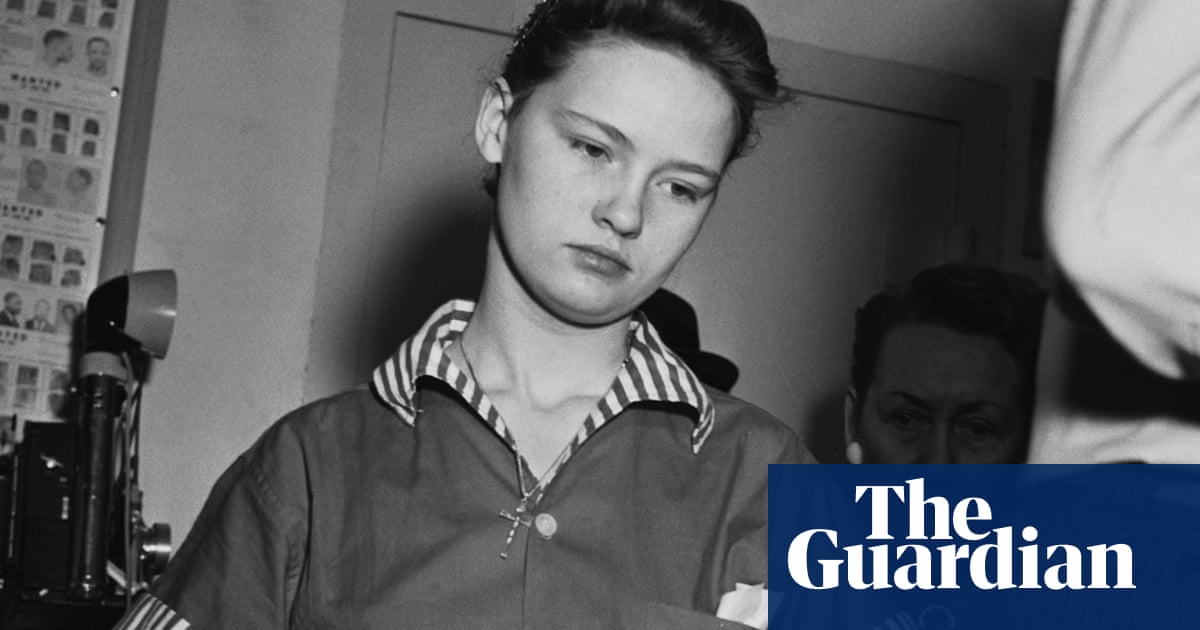
The name Caril Ann Fugate might not ring a bell, but she probably lives somewhere in the recesses of your mind. Fugate was half of the teenage couple that set off on a murder spree in 1958, tearing across Nebraska and Wyoming and taking the lives of 11 victims, Fugate’s mother, stepfather, and younger half-sister included. The story captivated the American public, and became a meme before there were memes. Were it not for Fugate, who was 14, and Charles Starkweather, an 18-year-old high school dropout who cultivated a James Dean-ish mien, it’s likely there would be no Badlands or Natural Born Killers. The title track of Bruce Springsteen’s 1982 album Nebraska is sung from Starkweather’s point of view.
Bowlegged and barely 5ft 5in, Starkweather was every inch the ruthless rebel with his black motorcycle jacket and the cigarette that was a permanent fixture in his scowl. With her blank expression, Fugate was harder to read, even after Starkweather’s execution. Fugate was sentenced to life in prison, and images of her behind bars call to mind an Antonioni heroine: distant, subdued, unrepentant.
A disquieting new version of Fugate emerges in The 12th Victim, Showtime’s four-part docuseries that re-examines their legacy and pokes at the holes in the narrative. Using archival footage and interviews with a parade of experts, the series takes its time re-establishing the story that held America in its grip and had the residents of Lincoln, Nebraska, pushing furniture against their doors for fear of encountering teenage murderers. Eventually, the project slides out of familiar true crime territory and stakes out new ground. What if Fugate hadn’t been the willing accomplice? What if she was a captive, and a victim herself?
“It’s about more than just a crime,” says Nicola B Marsh, the series director, to the Guardian. “It’s about acquiescence and culpability.” Marsh has spent most of her career working as a cinematographer (including on the Oscar winner 20 Feet From Stardom). None of the works she has directed, including the TV series Song Exploder and a documentary about the transgender skateboarder Leo Baker, have focused on true crime, which might explain her unorthodox and feminist approach to this project.
Over the year and a half that Marsh researched and shot the series, the narrative of two ruthless and passion-drunk teenagers fell apart. What emerged was a more complicated portrait: a boy undergoing a psychotic breakdown, and a 14-year-old girl doing her best to protect the people she loved – and to protect herself. Fugate had recently broken up with Starkweather when he showed up at the door of her family home. He told her to do as he said, or he would kill her family. Only later, according to Fugate, did she learn that he had already murdered them. “Even as a 14-year-old, I think the reaction is: I’ve got to get the temperature down. I got to get his heart rate down,” Marsh reasons. “If somebody you’re really close to has a psychotic break, you don’t maybe push back against them really hard very quickly, because you’re convinced that you’re going to be able to stabilize the situation and things are going to be OK.”
While the Showtime series dutifully feeds the true crime frenzy that dominates podcast and documentary programming, it takes a meta approach to its investigation. In addition to looking at what really happened to Fugate, and her reasons for staying by Starkweather’s side, it examines the prevailing impulse to pigeonhole the duo as a pair of violent and passionate lovebirds. “It’s not a good story unless they are lovers committed to individualism and freedom,” Jean Munley, the author of The Rise of True Crime, says in her interview. “Nobody wants to know about a 14-year-old-girl being raped and forced to partake in a murder spree.”
The 12th Victim includes clips of films that have taken inspiration from the Starkweather story: Martin Sheen and Sissy Spacek in Badlands, Woody Harrelson and Juliette Lewis in Natural Born Killers. Absent from the series are many of the crime scene photographs, images that show the horrific and psychosexual nature of the murders. “I felt quite strongly and Liza [Ward, the novelist granddaughter of two of Starkweather’s victims] felt strongly that it’s really traumatizing for the relatives of people who’ve been murdered for the most well-known photo of that person to be that crime scene photo,” says Marsh.
Fugate made parole in 1976 and resettled in smalltown Michigan, where she worked at a hospital and after hours as a nanny. Starting over wasn’t really possible. Her reputation hung over her like a shadow, and after many decades of living in the vise of trauma, she decided to tell the world what had really happened.
It isn’t until the fourth and final episode that the show swerves into an interrogation of the prevailing narrative and presents a different version. A softer, more relaxed Fugate appears in home video footage of a surprise birthday party attended by a cast of teddy bears and the two children who she looks after and who clearly adore her. She appears on the television show Lie Detector, and dissolves into sobs when the host, F Lee Bailey, informs her that she passed the test.
A key sympathizer was Linda Battisti, a longtime true crime fan and former Department of Justice trial lawyer. She read Fugate’s trial transcripts at the local library, and thought the facts in Fugate’s confession did not add up. “I couldn’t help but think the prosecutors knew she was innocent,” she says. “The idea that they went ahead with it was appalling. But I think they thought they could get away with it because she was a no-count, nobody, white trash girl.”
Battisti eventually quit her job and devoted 12 years to researching the Nebraska murders for The Twelfth Victim, the book she co-wrote and on which the series is based. Battisti, who appears in the series as a talking head, hopes that the show will raise awareness, and that Fugate might get a pardon. Fugate, 79, now lives in Ohio and maintains that her main aim is to be buried next to her mother when she dies. “People don’t really realize that I lost my family, too,” she says.
“We know so much more about a juvenile’s brain today than anyone did then,” Battisti says. “If I had been a 14-year-old girl and somebody had said, ‘I’m going to kill your parents unless you do everything I say,’ I would believe them in order to save my family.”
The messiness of the Fugate affair still unsettles Marsh. “There were moments probably where she could have escaped and could have told somebody, and she didn’t,” the director says. “But when you look at Caril’s story and put yourself in her shoes, I think a lot of people would have done what she’d done.”
The 12th Victim is available on Showtime on 17 February and in the UK and Australia at a later date












